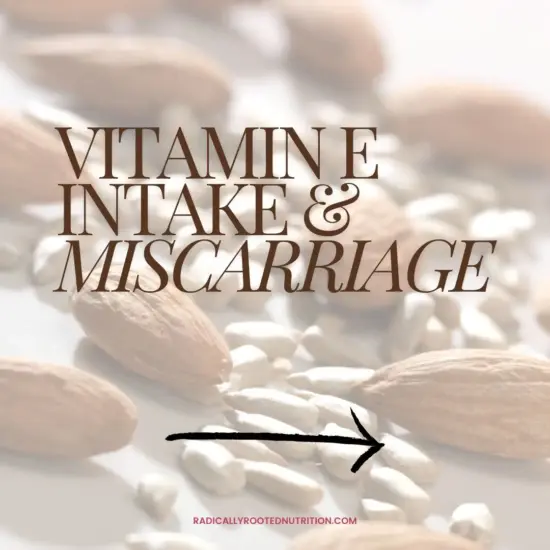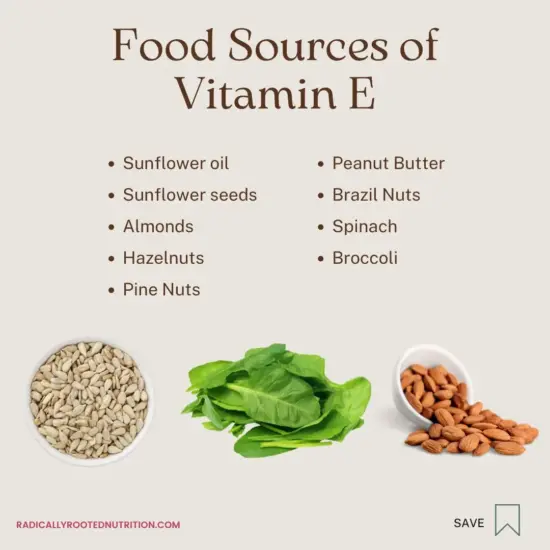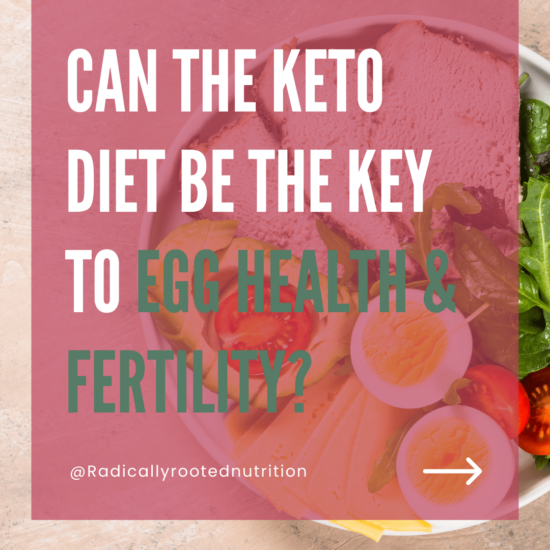Is Vitamin E the Solution for Recurrent Miscarriage?
Recurrent miscarriage, defined as the loss of two or more consecutive pregnancies, is a deeply distressing experience for many couples that I work with. Despite advancements in medical science, about 1-2% of couples trying to conceive face this challenge. While the causes are multifactorial and often elusive, there is growing interest in the potential role of vitamin E in improving pregnancy outcomes, especially for those who experienced recurrent miscarriage. As a dietitian, I aim to provide an evidence-based perspective, so let’s talk about how vitamin E can support pregnancy outcomes and potentially minimize the risk of recurrent miscarriage.

Understanding Recurrent Miscarriage
Recurrent miscarriage can stem from various factors, including genetic abnormalities, anatomical issues, hormonal imbalances, autoimmune disorders, and unexplained reasons. The emotional and psychological toll of recurrent miscarriage is significant, prompting many to seek both conventional and alternative therapies to sustain a healthy pregnancy.
What is Vitamin E?
Vitamin E is a fat-soluble antioxidant that plays a crucial role in protecting cells from oxidative damage. It exists in eight different forms, with alpha-tocopherol being the most biologically active in humans. Vitamin E is essential for immune function, skin health, and preventing oxidative stress.
The Link Between Oxidative Stress and Miscarriage
Oxidative stress is a significant factor in the etiology of recurrent miscarriage. It results from an imbalance between free radicals and antioxidants in the body, leading to cellular damage.
During pregnancy, oxidative stress can damage placental tissues, disrupt hormonal balance, and impair fetal development, potentially leading to miscarriage. Studies suggest that women with recurrent miscarriages may have higher levels of oxidative stress, making antioxidants like vitamin E a potential therapeutic option.
Unlocking Fertility: The Impact of the Keto Diet on Egg Freezing For many clients, the quest for the optimal diet […]
1- Antioxidant Properties:
By neutralizing free radicals, vitamin E can reduce oxidative stress, potentially protecting the placenta and supporting fetal development. Studies have shown that women with recurrent miscarriages often have lower levels of antioxidants, including vitamin E, and higher levels of oxidative stress markers like malondialdehyde (MDA). Supplementing with vitamin E can help restore the balance between antioxidants and free radicals, potentially reducing the risk of miscarriage.
2- Immune Function:
Vitamin E also plays a crucial role in modulating the immune system. During pregnancy, a balanced immune response is essential to support fetal development and prevent complications. Research conducted on both animals and humans has provided valuable insights into the effects of vitamin E supplementation on immune function. These studies have shown that supplementing with vitamin E above the recommended dietary levels can actually enhance the overall function of the immune system. Research has indicated that vitamin E can influence cytokine balance, which is vital for maintaining a healthy pregnancy. For instance, a study found that vitamin E supplementation decreased miscarriage rates and increased placental levels of IL-6 and vascular endothelial growth factor (VEGF), which are crucial for immune regulation and placental development
3- Anti-Inflammatory Effects:
Inflammation is another critical factor that can contribute to recurrent miscarriage. Vitamin E has been shown to possess anti-inflammatory properties, which can help mitigate inflammation-related pregnancy complications. An animal study demonstrated that vitamin E could reverse or prevent the inflammatory effects of lipopolysaccharide, a bacterial toxin, thereby improving embryo viability. This suggests that vitamin E can create a more favorable environment for embryo implantation and development by reducing inflammation.

4- Improves Endometrial Thickness:
Inflammation is another critical factor that can contribute to recurrent miscarriage. Vitamin E has been shown to possess anti-inflammatory properties, which can help mitigate inflammation-related pregnancy complications. An animal study demonstrated that vitamin E could reverse or prevent the inflammatory effects of lipopolysaccharide, a bacterial toxin, thereby improving embryo viability. This suggests that vitamin E can create a more favorable environment for embryo implantation and development by reducing inflammation.
Dietary Sources
Vitamin E is found in various foods, including:
- Vegetable oils: Wheat germ, olive oil, and sunflower oil
- Nuts and seeds: Sunflower seeds, almonds, and peanuts
- Leafy green vegetables: Spinach and collard greens
- Other vegetables: Pumpkin, capsicum, and asparagus
- Fruits: Mango and avocado
Recommended Dosage and Forms
Commonly studied doses of vitamin E for fertility range from 200 IU to 800 IU per day. For example, a study used 400 IU of vitamin E twice daily (totaling 800 IU per day) for three months prior to embryo transfer[1]. It is important to note that vitamin E supplementation must be discontinued before an IVF transfer, IUI procedure and pregnancy. High intakes of vitamin E can lead to adverse effects such as preterm birth, abdominal pain, and increased oxidative stress during pregnancy.
Vitamin E is available in various forms, including natural (d-alpha-tocopherol) and synthetic (dl-alpha-tocopherol) forms. Natural forms are generally considered more effective due to better bioavailability.
Bottom Line
Vitamin E plays a vital role in preventing recurrent miscarriages by reducing oxidative stress, supporting immune function, mitigating inflammation, and potentially improving endometrial health. While supplementation can be beneficial, it is essential to consult with a dietitian and physician to determine the appropriate dosage and ensure a balanced diet rich in natural sources of vitamin E. By optimizing vitamin E intake, we can support better pregnancy outcomes and overall maternal health.




